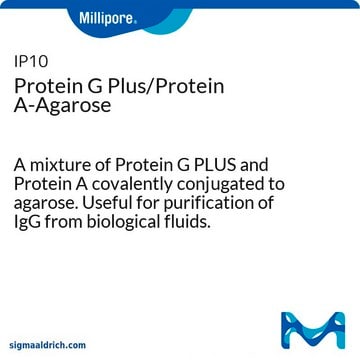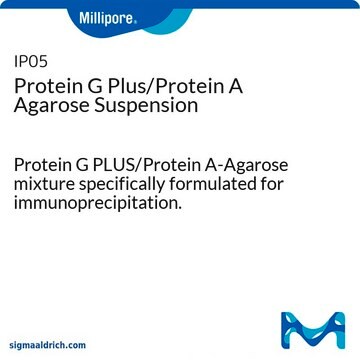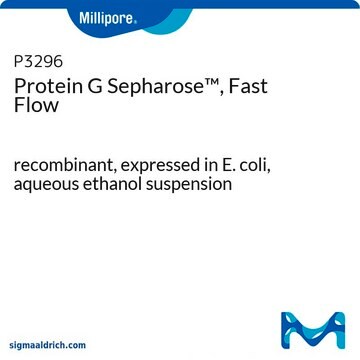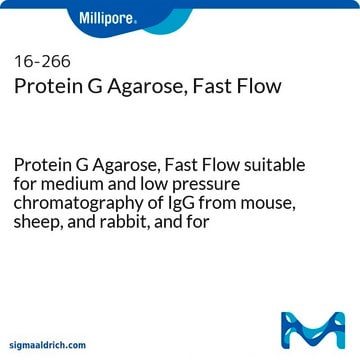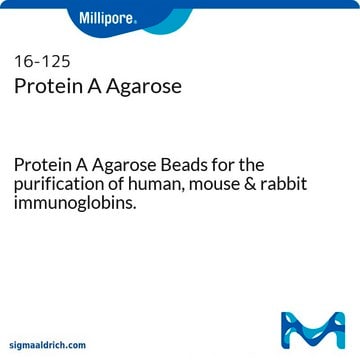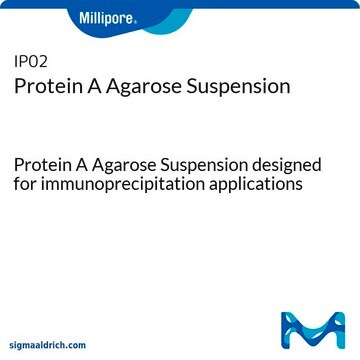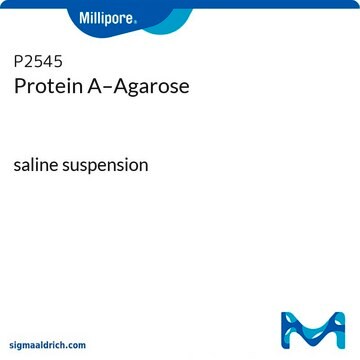IP04
Protein G Plus-Agarose Suspension
Protein G PLUS agarose suspension specifically formulated for immunoprecipitation.
Se connecterpour consulter vos tarifs contractuels et ceux de votre entreprise/organisme
About This Item
Code UNSPSC :
41116133
Nomenclature NACRES :
NA.56
Produits recommandés
Forme
slurry (Liquid)
Contient
≤0.1% sodium azide as preservative
Fabricant/nom de marque
Calbiochem®
Conditions de stockage
do not freeze
Technique(s)
immunoprecipitation (IP): suitable
Adéquation
suitable for immunoprecipitation
Conditions d'expédition
wet ice
Température de stockage
2-8°C
Description générale
Designed for immunoprecipitation applications. This product is blocked with BSA to reduce non-specific binding and cannot be used for purification; best for bovine, goat, human, and rat IgG and for mouse IgG1.
Protein G PLUS agarose suspension specifically formulated for immunoprecipitation.
Avertissement
Toxicity: Standard Handling (A)
Autres remarques
Agarose solution is supplied ready to use. Protein G Plus agrarose is blocked with BSA and should not be used for immunoglobulin purification or covalent cross-linking. For immunoprecipitation reactions 15 µl/µg primary antibody is recommended. Preclearing will minimize extra bands resulting from nonspecific precipitation. To preclear, add to the sample 20 µl agarose conjugate and 1 µg normal IgG from the same species as the immunoprecipitating antibody. When immunoblotting is used for detection, some secondary antibodies can react nonspecifically with BSA or other proteins present at high concentrations in the sample. This can be eliminated by reducing the concentration of secondary antibody.
Informations légales
CALBIOCHEM is a registered trademark of Merck KGaA, Darmstadt, Germany
Code de la classe de stockage
11 - Combustible Solids
Classe de danger pour l'eau (WGK)
WGK 1
Point d'éclair (°F)
Not applicable
Point d'éclair (°C)
Not applicable
Certificats d'analyse (COA)
Recherchez un Certificats d'analyse (COA) en saisissant le numéro de lot du produit. Les numéros de lot figurent sur l'étiquette du produit après les mots "Lot" ou "Batch".
Déjà en possession de ce produit ?
Retrouvez la documentation relative aux produits que vous avez récemment achetés dans la Bibliothèque de documents.
Les clients ont également consulté
Leo K Iwai et al.
Journal of proteome research, 9(6), 3135-3145 (2010-05-05)
Type 1 diabetes, in human patients and NOD mice, results from an immune attack on insulin-producing beta-cells of the pancreas by autoreactive T lymphocytes. In NOD mice, genetically controlled perturbations in the signaling pathways downstream of the antigen-specific T cell
Boyang Zhao et al.
American journal of physiology. Cell physiology, 302(1), C27-C45 (2011-09-24)
Although extensive phosphoproteomic information is available for renal epithelial cells, previous emphasis has been on phosphorylation of serines and threonines with little focus on tyrosine phosphorylation. Here we have carried out large-scale identification of phosphotyrosine sites in pervanadate-treated native inner
Xin Wang et al.
The Journal of biological chemistry, 294(43), 15733-15742 (2019-09-06)
REV7, also termed mitotic arrest-deficient 2-like 2 (MAD2L2 or MAD2B), acts as an interaction module in a broad array of cellular pathways, including translesion DNA synthesis, cell cycle control, and nonhomologous end joining. Numerous REV7 binding partners have been identified
Matthew M Halpert et al.
FASEB journal : official publication of the Federation of American Societies for Experimental Biology, 34(6), 8082-8101 (2020-04-17)
Mammalian immune responses are initiated by "danger" signals--immutable molecular structures known as PAMPs. When detected by fixed, germline encoded receptors, pathogen-associated molecular pattern (PAMPs) subsequently inform the polarization of downstream adaptive responses depending upon identity and localization of the PAMP.
Matthew M Halpert et al.
Stem cells and development, 25(10), 774-787 (2016-03-17)
The remarkable functional plasticity of professional antigen-presenting cells (APCs) allows the adaptive immune system to respond specifically to an incredibly diverse array of potential pathogenic insults; nonetheless, the specific molecular effectors and mechanisms that underpin this plasticity remain poorly characterized.
Notre équipe de scientifiques dispose d'une expérience dans tous les secteurs de la recherche, notamment en sciences de la vie, science des matériaux, synthèse chimique, chromatographie, analyse et dans de nombreux autres domaines..
Contacter notre Service technique
